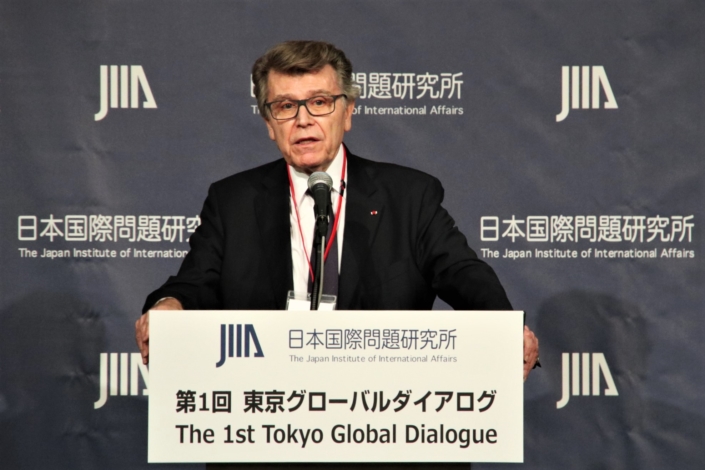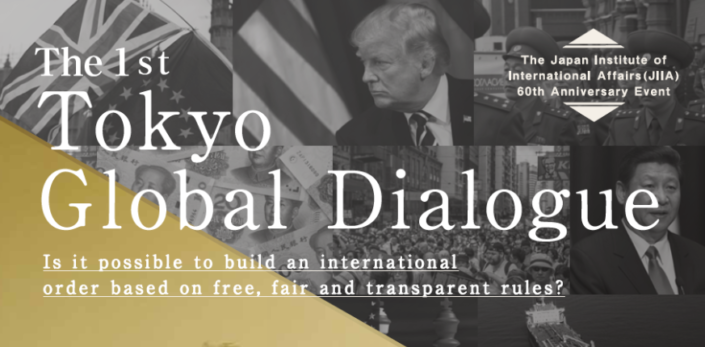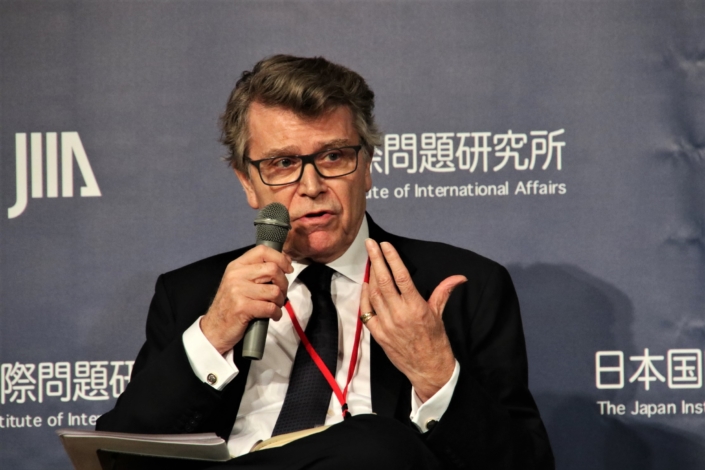The World in the Next 30 Years
Keynote speech at the 1st edition of Tokyo Global Dialogue organized by the japan Institute of International Affairs. Tokyo, December 2, 2019.
Speech starting at 1:06:00
Thank you very much. Well, first I would like to congratulate the Japan Institute of International Affairs, which is 60 years old…, which is quite young. (laughter) Actually, my first trip to Japan was—to be very precise—in October of 1973. I had just become appointed Director of the Policy Planning Staff in the French Foreign Ministry. I was young at the time! And I think it was the first time I had an opportunity to meet with the Japan Institute of International Affairs, which was 14 years old. So, congratulations, and I’m very pleased to be here in Japan for something like the hundredth time.
I would like to be a little provocative, because it is the best way, I think, to wake everybody up. And the first remark I would like to make is that the idea that there was, once upon a time, something like a liberal international order, is a myth. It is a total myth. There was no international order. There was, after the Second World War, something which was called the Cold War. And the Cold War lasted, until the collapse of the Soviet Union—that is, to be very precise, December 1991. Actually, the collapse of the Soviet Union took two years, starting with the collapse of the communist order in Eastern Europe, during 1989, and the Soviet Union itself collapsed in December of 1991. So who could say that there was an international order between 1945 and 1989 or 1991? There was a liberal Western order, which is something totally different. And even that is more subtle, because during the Cold War, the world was in fact divided in three parts, in a fuzzy way. There was, the so-called West, the Western alliance, essentially, organized around NATO, and to which Japan was added because we used to say, typically within the Trilateral commission that some of you know well, that Japan was part of the West. And by the way, when we wanted to come here to Tokyo, we had to go through Anchorage, because it was quite difficult actually to fly over Russia at the time. I don’t know how many tens of times I’ve taken that route. And so Japan was considered to belong to the Western world too. A bit overfetched, you know, but… A huge part of the world was not part of this order: the Soviet sphere of influence and the so-called Third world. That was at the time of decolonization, and in fact the Third world was an area of competition for the Soviet world and the Western world. And more often than not, the Communist part of the world was stronger than the West. Should I also remind you that after the victory of Mao Zedong in 1949, the Soviet world was considered by everybody to be winning in Asia. It was only after the Sino-Soviet schism in 1960 that people started to think that the extending communism all over the planet was not bound to succeed. So I have to remind these things, because, more often than not, we are reconstructing a past which never existed.
So, now… “is it possible to rebuild an international order”? Well, first, is it possible to build an international order? Such thing has never existed, so it would be the first time. No? (laughter) So is it possible to build an international order based on freedom, fairness, transparency? You know that fairness is one of the most difficult concepts to define, and as for inequalities it is not easier. It has become a major center of interest due to the explosion of technological progress. As for transparency, it is one of the biggest myths in life, you know. Would any of you ladies and gentlemen like to be so transparent that I could immediately see what you are thinking about right now? (laughter) No? So, I am not, of course, pleading against transparency, but I think that if we talk about transparency, we have to be much more specific about what we mean. And by the way, to give a proper definition of transparency would require proper definition of “full information”, because the concepts of transparency and information are closely related. And it is of course impossible to have full information about anything. Information is also a very complex concept.
All this being said, if nevertheless you force me to give an answer: is it possible to, etc…? My answer is no. (laughter) Nabil Fahmy said his answer is yes, but I know him and I admire him enough to tell him, friendly, that although he said that, he doesn’t believe it. (laughter)
So now what I would like to do with you is a little bit of more classical geopolitics, because classical geopolitics is still relevant to a large extent. Of course the technological development in particular has made things much more difficult but nevertheless, geopolitics is still relevant. The defining turning point since the Second World War is clearly the collapse of the Soviet Union. And the collapse of the Soviet Union, I would like to remind just one thing about it. It is in fact two events for the price of one, if I can say so. One is of course the collapse of the communist political system, and its failure to a large extent is the consequence of the technological revolution because they were unable to compete with the United States in particular, and the West in general, in terms of economic development. In particular, the military system was unable to catch up. And the second aspect is the collapse of the Russian empire. It’s important to distinguish between the two because the 20th century is the story of collapse of empires. And the Russian Empire was the last one to collapse. And it took place, in the first stage, in a relatively smooth way. But the collapse of empires is always, historically speaking, a long, long-term phenomenon. And I think that what we have been seeing in the last thirty years is just the beginning of the consequences of the collapse of the Russian Empire. And the collapse of the Russian Empire has reopened issues that had been frozen in the aftermath of the First World War, the collapse of the Austrian -Hungarian Empire and the German Empire in Europe. And of course of the Ottoman Empire which, it seems to me, I say it humbly in front of Nabil, is the beginning of everything else in the Middle East. It has reopened the whole game there. Of course, the Ottoman Empire had been weak at the end of the 19th century and the beginning of the 20th century, and all these issues are still with us.
Now, all this been given, what is the situation today? I think we can state it relatively simply looking over the next thirty years. Why the next thirty years? Because in 30 years from now, ladies and gentlemen, we will be in 2049. Hm? And 2049 will be the 100th anniversary of the victory of Mao Zedong. And the Chinese are now openly stating—openly, which was not the case until Hu Jintao, this started with Xi Jinping – their ambition to be the number one country in the world. They are not children, the Chinese. Yes, they talk about the international order, they would like to change it in their favor. In that sense, they are not a status quo power. At the same time, it is true that they want to avoid war, because the Chinese strategic thinking has always been to win without fighting. It has always been their fundamental strategy. But, this being said, they want to have all the attributes of power in the most classical sense. That is, military power, and of course the technological power which underlies all kinds of military power. It is really interesting to listen to the Chinese because they have a double speech. They have several levels of speeches. According to one level, they are a friendly country, which wants to develop good relations with everybody on the planet. Mutually beneficial, economically, etc. Socially and economically benefiting. At the second level, it’s a tough power game. When we come to talk about the South East China Sea, there is no doubt; it’s a pure power game. By the way, they are not the only ones not to pay any attention to international law. I’m sorry to say the US doesn’t pay much attention to international law either, typically in the case of the Israeli-Palestinian issue, as was so just a few days or weeks ago. Usually great powers do not pay much attention to international law. When they become weaker, they start to pay more attention. At the time of General de Gaulle — France didn’t care much about international law. France started to pay more attention to international law when we became, in relative terms, weaker. When we are really very small, then we will be the champions of international law. (laughter) Not everybody can do like Mr. Junker, who is as you know the outgoing president of the European Commission. Before that, he was Prime Minister of Luxembourg, and he once made – that’s a true story – he once made a trip to China, and after having drunk a few glasses of wine – because he likes wine and other alcohols (laughter) – he raised his glass with I think it was Hu Jintao, in Beijing, and said, “China and Luxembourg together, it’s one-fourth of human population.” (laughter) Which was factually true. So you know the relation of a country with international law depends heavily on its position on the scale of power.
So in fact, 2049 is the date we have to have in mind. And clearly the US-China relations will be the dominant geopolitical issue in the next 30 years. It is the most important issue that we will have to look at. As for the United States, frankly speaking, I respectfully disagree slightly with you, Avril, I think that the United States will no longer be like before. Because whoever is in power in Washington, they will have to deal with a totally different world. The context has changed. The priorities are different. Therefore all those who were used to depend on the United States for their security will have to rethink their interests in a fundamental way.
Now, a few words about China. I know that in Japan particularly but not only in Japan, there are people who believe that China is actually in deep trouble. I hear this very often, that their economic situation is much more difficult than they say, they have significant international problems, Hong Kong might be a very serious issue for them, etc., etc. Of course, it is difficult, and if it were not difficult for China, Xi Jinping would not have come into power. Because Hu Jintao was considered to be a weak leader, not a strong leader. They wanted to have a strong leader precisely to be able to face some very tough situations. But to bet that China is so weak that they will lose their fight, their competition with the United States, in the next few years or in a matter of one or two decades, I think would be running the risk of wishful thinking. And starting with that hypothesis is, in my humble judgment, a big mistake. And by the way, if such were the case, and if in the limit there would be a real collapse of the communist regime, or the neo-communist regime, in China, that could be a real catastrophe for the whole world. I remember a conversation with Lee Kuan Yew, who was a very wise man. He said there is something even worse than a strong China, which is a too weak China. At every change of dynasty in China, there has been a civil war. So if it is what we have in the next few years, it would be, of course a totally new situation, but certainly not better than the situation we’re having now. Now, if they remain strong, which I think is by far the most likely hypothesis, then it means as I said that the issue of US-China rivalry will be the dominant one and all of us, we will have to adjust to it in the smartest possible way. And the question is often raised about a possible war between the US and China. Personally, I do not believe that the so-called “Thucydides Trap” of Graham Allison will work in this way. What could happen would be more the “Kindleberger Trap” as Joe [Joseph] Nye calls it, that is, a war rising as a consequence of the failure of global economic governance, which is not exactly the same. The only case when we could have a real classical war would be on Taiwan. In my judgment, of course. Could Hong Kong increase the risk of that? I do not believe so, because Hong Kong will go back legally to China in 2047 anyway. So what could happen is that there would be more and more people going into exile. Some of the youth will leave the country and gradually, the major economic activities will move from Hong Kong to other places in China, in Shenzhen, Shanghai, and elsewhere. But there is no risk for China to lose Hong Kong. For the Chinese, it is more a problem of image, and it is clearly not obvious how they will handle the situation. But over Taiwan, that could be a real challenge. They are now speaking a tougher and tougher language on Taiwan, and there is already a war going on right now, that’s a cyberwar. A cyberwar is raging, now, between mainland China and Taiwan. But apart from that I cannot imagine easily a major real war any time soon.
I will end these remarks with a few points on Europe. Firstly, for us, the European Union, the challenge was that the collapse of the Soviet Union was unforeseen. Of course, it was unforeseeable. That’s a philosophical remark and we have no time to discuss that. So we had to address very quickly this extraordinary situation, and we chose to enlarge very quickly. You know, we were twelve in 1989. Now we are 27. And the fact that we have enlarged so fast and took aboard several countries which were totally unprepared to join us, the fact that we have achieved that without collapsing, is in itself a great achievement. But it takes time, you know, to adjust to such an extraordinary development. Personally, I think that the Eurozone has become the backbone of the European construction, and that in spite of all these difficulties the so-called French-German axis will survive. We have always had disputes, ever since the time the European Union started to exist, but I do not anticipate the death of the European Union. Not only that but as you know, the first consequence of Brexit was to stop countries like the Netherlands and others to speak any more about the possibility of withdrawing. So the European Union is definitely not dead. My last sentence will be to say that I deeply think that not only us in Europe but the rest of the world needs a strong Europe. Why? Because we are no longer, and we will never be again an imperialistic power, but we are really a free association of free countries, something totally new in history, economically relatively successful in spite of all the difficulties, and in a certain sense, we are a model of social democracy which works – it is difficult, but it works. We need you and you need us.





